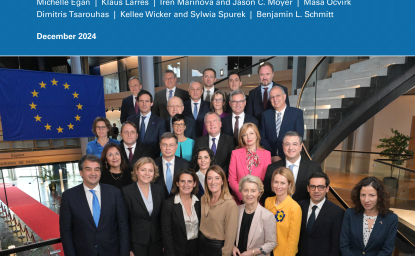Beyond the Desktop: The Potential of Additive Manufacturing (Episode 1)
Beyond the Desktop explores how additive manufacturing could affect the fields of medicine, aerospace, space technology and more.
Beyond the Desktop explores how additive manufacturing could affect the fields of medicine, aerospace, space technology and more.
Beyond the Desktop: The Potential of Additive Manufacturing (Episode 1)
The potential of desktop 3D printing has been covered extensively by the media. But many feel the true impact of this technology will be felt at the industrial level, where companies in different sectors hope to use additive manufacturing to make better products at a lower cost. The technology could soon be used to help make airplanes, automobiles, space stations, medical models and sensors – even organs—while also radically transforming our traditional supply chains. But at what cost? And what has to happen to ensure that this tremendous potential is reached?
In the Beyond the Desktop video series, we speak with people from startups, hospitals, long-established companies, government and academia to understand how additive manufacturing will impact how we make things. From airplanes to space stations, the technology provides complexity at a low cost. But we also seek to move beyond the hype and understand what changes need to happen for this potential to be realized and what unintended consequences we might need to anticipate.
There are five episodes on this series. This episode focuses on the overall potential of additive manufacturing, particularly in the industrial sector.
The potential of desktop 3D printing has been covered extensively by the media. But many feel the true impact of this technology will be felt at the industrial level, where companies in different sectors hope to use additive manufacturing to make better products at a lower cost. The technology could soon be used to help make airplanes, automobiles, space stations, medical models and sensors – even organs—while also radically transforming our traditional supply chains. But at what cost? And what has to happen to ensure that this tremendous potential is reached?
In the Beyond the Desktop video series, we speak with people from startups, hospitals, long-established companies, government and academia to understand how additive manufacturing will impact how we make things. From airplanes to space stations, the technology provides complexity at a low cost. But we also seek to move beyond the hype and understand what changes need to happen for this potential to be realized and what unintended consequences we might need to anticipate. There are five episodes on this video series, directed and produced by Aaron Lovell with the help of Joe Filvarof.
- See more at: https://www.wilsoncenter.org/3dprinting#sthash.7NzP96zt.dpuf
The potential of desktop 3D printing has been covered extensively by the media. But many feel the true impact of this technology will be felt at the industrial level, where companies in different sectors hope to use additive manufacturing to make better products at a lower cost. The technology could soon be used to help make airplanes, automobiles, space stations, medical models and sensors – even organs—while also radically transforming our traditional supply chains. But at what cost? And what has to happen to ensure that this tremendous potential is reached?
In the Beyond the Desktop video series, we speak with people from startups, hospitals, long-established companies, government and academia to understand how additive manufacturing will impact how we make things. From airplanes to space stations, the technology provides complexity at a low cost. But we also seek to move beyond the hype and understand what changes need to happen for this potential to be realized and what unintended consequences we might need to anticipate. There are five episodes on this video series, directed and produced by Aaron Lovell with the help of Joe Filvarof.
- See more at: https://www.wilsoncenter.org/3dprinting#sthash.7NzP96zt.dpuf
Director/Producer
Aaron Lovell
Associate Producer/Camera
Joseph Filvarof
Editor
Chris Billing
Executive Producer
David Rejeski
Beyond the Desktop is a production of the Science and Technology Innovation Program at the Woodrow Wilson International Center for Scholars.
Aaron Lovell, Science and Technology Innovation Program
(202) 691-4320
aaron.lovell@wilsoncenter.org


The Science and Technology Innovation Program (STIP) serves as the bridge between technologists, policymakers, industry, and global stakeholders. Read more




